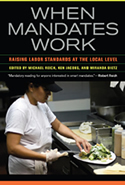February 09, 2014
 My copy of When Mandates Work: Raising Labor Standards at the Local Level, edited by Michael Reich, Ken Jacobs, and Miranda Dietz, arrived earlier this week and I finally had a chance to look through it this weekend.
My copy of When Mandates Work: Raising Labor Standards at the Local Level, edited by Michael Reich, Ken Jacobs, and Miranda Dietz, arrived earlier this week and I finally had a chance to look through it this weekend.
The book is a collection of papers that assess the results of San Francisco’s unique experiment, conducted over more than a decade starting in the mid-1990s, to use local action to raise the wages, benefits, and working conditions of low-wage workers through a series of legislated mandates on employers. Key elements of these efforts included a city-wide minimum wage (currently $10.74 per hour), a minimum health spending requirement (for firms with 20 or more employees), and a paid sick days law.
According to estimates by Reich and Jacobs, the full set of enacted legislation taken together raised the minimum hourly compensation cost in San Francisco in 2013 to between $10.65 and $12.83, depending on firm size. These rates were between 33 and 60 percent higher than the California minimum wage and 47 to 77 percent higher than the federal minimum wage in the same year.
Yet, as subsequent chapters of the book document in detail, separately and together these various mandates did not “diminish…the strength of [the city’s] economy” and, in particular, had no “measurable impact on employment.” Many of the measures improved productivity, reduced turnover, and changed the norms for businesses working in San Francisco.
As Reich and Jacobs note, San Francisco acted in a context of “eroding federal protections, the revival of the central city, and rising economic inequality” –conditions that prevail in many other cities across the country. As Dietz, Jacobs, and Reich conclude later:
“While there are limits to how far employer mandates can go without creating negative employment consequences, San Francisco has not reached them. The evidence cited in this book … suggests that the United States could go significantly further in protecting labor standards without harming employment.”
For a fuller description of the book, see the write-up at the Institute for Research on Labor and Employment. You can order a copy directly through the University of California Press.
This post originally appeared on John Schmitt’s blog, No Apparent Motive. February 9, 2014






